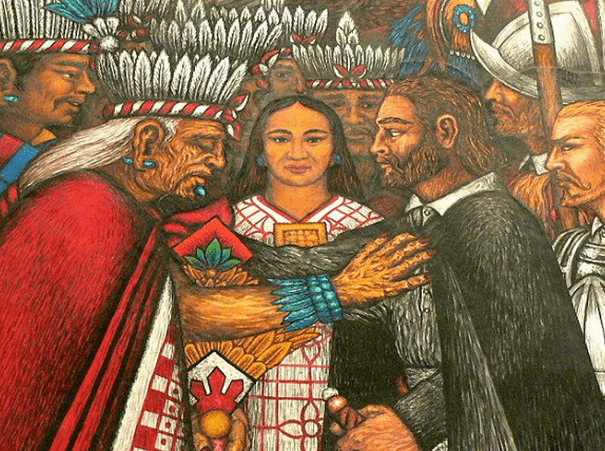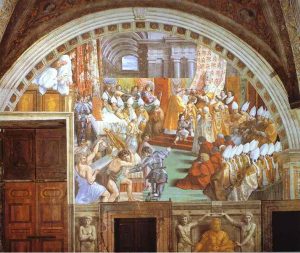Winner of the Fall 2016 StMU History Media Award for
Best Article in the Category of “People”
Best Article in the Category of “World History”
Largely due to the importation of disease and use of superior weapons, the Spaniards were able to conquer the Aztec capital of Tenochtitlan, kill the empire’s last emperor, Cuauhtémoc, and bring the Aztec empire to an end. Few know of La Malinche, the indigenous interpreter of Hernán Cortés, whose linguistic abilities were used to facilitate important conversations between the Spaniards and the indigenous leaders. Without the help of La Malinche, perhaps the Aztec empire would have survived.
Born between 1502 and 1505, La Malinche was named Malinalli Tenepal, the first part of her name being a Nahuatl term for the twelfth day of the month in correspondence to the Aztec calendar, and the second part of her name meaning “lively.” She was born of nobility in Paynala within the region of Veracruz. Her troubles started at a young age after the death of her father. La Malinche was ousted from her home to ensure her new half-brother received the inheritance of the family instead of her, since she was the eldest child. She was given to “some Indians of Xicalango.”1 Then the Indians gave her to a nobleman in Tobasco, a region in the Yucatan. When Cortés arrived to Tobasco, he was offered twenty slaves, one of them being La Malinche. Having lived in Veracruz, a Nahuatl-speaking region, and then being sold into a Maya-speaking region, La Malinche knew both languages and she was soon recognized for the linguistic talents that could benefit Cortés in his conquests.2

The few glimpses of La Malinche and how her presence as an interpreter accelerated the fall of the Aztec empire can be found in the writings of the Spanish explorers, specifically from Hernán Cortés, her “lord and master.”3 From the second letter Hernán Cortés wrote to Emperor Charles V, dated October 30, 1530, Cortés speaks of La Malinche as “a female interpreter that I had, who was a native of this country, and whom I obtained at Putunchún on the Rio Grande.”4 This confirms the vague aspects of her life that we already know. But most importantly, in this context, this letter goes on to tell of a scenario in which La Malinche saved the Spaniards from an ambush by the Cholulans. La Malinche was told by the wife of a native leader that they planned to attack the Spaniards and if La Malinche came with them, she would be protected. La Malinche delivered this message to Cortés, which ultimately led to the massacre of Cholula and provided a direct path to march towards Tenochitlan, the capital of the Aztec empire.5 This leads to the question of whether or not La Malinche was a traitor or a survivor. Did she explicitly want the Aztec empire to fall or did she just want to save herself from the carnage?
With no traces of primary sources from La Malinche herself, her story has been retold by various scholars without much consistency, nothing ever being certain. Up until the twentieth century, La Malinche was viewed as a traitor to her country Mexico. In 1861, on the celebration day of Mexico’s Independence, Ignacio “El Nigromante” Ramírez, a Mexican journalist, addressed the Mexican people by saying, “One of the mysteries of fate is that every Mexican owes his downfall and disgrace to a woman, and to another woman his salvation and glory; the myth of Eve and Mary is reproduced everywhere; we indignantly remember Cortés’s mistress and will never forget, in our gratitude to Doña María Josefa Ortiz.”6 La Malinche is seen as playing a key role in the subjugation of the Mexican peoples to Spain, while Doña María Josefa Ortiz did the contrary and liberated the country. However, many Chicana writers and modern scholars are trying to rewrite the tale of La Malinche to understand the complexities of her choices and to vindicate her. For example, Gloria Anzaldua promotes the idea that La Malinche had a “new consciousness,” that she voluntarily served as the interpreter of Cortés not only to save herself, but also because she knew that a new mestiza culture was going to be born (especially considering she had a son with Cortés in 1524).7 She made a conscious effort to exchange language and cultural aspects from each side in order to facilitate the emergence of the new mestiza society; however, with that came brutal consequences in the shape of warfare and mass death in the New World.
Whether or not La Malinche’s role as Cortés’s interpreter was traitorous, simply an effort to survive, or some other complex reason involving love for Cortés, hate for the Aztec empire for the cruelty she faced after being ousted from her home, or promotion of the new mestiza culture, no one will ever know the true story of the Indian, slave woman who traveled alongside Cortés towards the culmination of the Aztec empire.
- Bernal Castillo del Díaz, The Discovery and Conquest of Mexico, 1517-1521 rev. American ed., trans. A.P. Maudsley (New York: The Noonday Press, 1965), chap. 22-23. ↵
- Pilar Godayol, “Malintzin/ La Malinche/ Doña Marina: re-reading the myth of the treacherous translator,” Journal of Iberian and Latin American Studies 18, no. 1 (April 2012): 61-68. ↵
- Castillo del Bernal, chap 23. ↵
- Hernan Cortes to Emperor Charles V, October 30, 1520, in Letters of Despatches of Hernando Cortes, to the Emperor Charles V., trans. (New York: Wiley and Putnam, 1843), letter II. ↵
- Hernan Cortes to Emperor Charles V, October 30, 1520, in Letters of Despatches of Hernando Cortes, to the Emperor Charles V, letter II. ↵
- Rosario Pérez-Lagunes, “The Myth of La Malinche: From the Chronicles to Modern Mexican Theater” (PhD dis., Virginia Polytechnic Institute and State University, 2001), 24. Although she was of Spanish descent, Doña María Josefa Ortiz was born in Valladolid, Mexico in 1768 and identified herself as Mexican. She and her husband were both a part of the rebellion that ultimately led to Mexico’s independence from Spain in 1824. ↵
- Godayol, 68-70. ↵



230 comments
Barbara Ortiz
Congratulations on your award. This is a great Article. I had not heard of La Malinche or Dona Marina before my current course. I also found it interesting that when researching some deeper information on Pocahontas, that at the bottom of the page, it said “see also: La Malinche” as imply a connection in their stories – Native women, no longer living with their native people, learning new languages, cultures, and religion. It definitely leans more toward survivalist theory.
Melyna Martinez
I believe the article showcases how the Malinche maybe was a traitor to her people, but she is the bridge between natives and Spanish conquistadores. I also think that she used Cortez to save herself she knew the mixing of cultures would be hard but she did it anyways. While she did it in order to survive, she did cause the downfall of her people.
Noelia Torres Guillen
This article brought in new theories as to why La Malinche did what she did. Since we do not have personal records of La Malinche, we have to make out own interpretations from what we were given. You have to think about the many factors that come into play before you form your own personal opinion. La Malinche could’ve told Cortes about the ambush because she was ousted from her home. Could also be because she could’ve fallen in love with Cortes. Whatever the reason, we can only make up our own perspectives. Loved this article!
Anayetzin Chavez Ochoa
Usually, when I hear the name ‘La Malinche’, all I can recall is her legend of being a traitor to the natives for interpreting for the Spanish. No one remembers people’s victories, only the bad, and cling to such negativity far past the subject’s lifespan. Reading this article, I can now see she was 3-dimensional with a backstory of great nobility, not without her share of mystery. It’s interesting to see how people pull apart the story to formulate some consistent conclusion and how Chicana writers praised her for her choice. I saw in the citations that her name is spelled ‘Malintzin’, and I remembered how my name is Nahuatl. Thank you for writing this! It was very covert in tone while sharing as much as it could.
Gabriella Parra
I had never heard the theory that La Malinche acted as an interpreter for Hernán Cortés because she foresaw the emergence of Mestizo culture, but I don’t think this is very likely. It’s possible that she saw a possible benefit from incorporating Spanish traditions into her society, but she must have known that this cultural mixing would not come peacefully. I think it is more likely that she acted as a translator as a way of saving herself.
Luke Rodriguez
I found this article to be very interesting because I have always kind of had an interest in ancient civilization and knowing how life was back then. I had done a project about Tenochtitlan when I was in middle school and that sparked my interest because I had done a lot of research on the topic and learning even more about what had happened to the Aztecs was very informative.
Fatima Esparza
Your article does a great job of presenting an unbiased view on whether La Malinche was a traitor or a survivor. This argument can be understood from both perspectives. My opinion on La Malinche is that she did it for her own interests, which is saving herself, but while doing so, she betrayed the Aztec Empire, which led to their destruction. This story can lean toward both sides of the argument, and biased views also determine how this story can be seen.
Lucia Rogel
This tone and word choice used in this article seem to be slightly biased to portray the innocence of La Malinche. However, this article can truly persuade the reader to have an open mind towards the many reasons that could have led La Malinche to remain loyal to Cortes, or if she ever did. I think that she was an extremely powerful woman, who might have not been truly honest in her translations for Cortes and the rest of the Spaniards. With that much power and unknown opinions towards the indigenous groups that passed her on until she ultimately remained a slave, it’s interesting to wonder about the legitimacy of her translations and loyalty.
Sydney Nieto
Great article. I like how it was easy to read and to understand. From this article I personally believed that La Malinche wasn’t a traitor, as she was outcasted and had been sold. She was simply trying to survive, especially being a woman. I do find it interesting how her story was retold many times but with no consistence. Overall, good job.
Jose Maria Gallegos Cebreros
First of all congrats on a great article, I really enjoyed reading it. I liked that you kept it short and simple, the length of your article its the shortest i have seen in the platform so far but it is one of the ones that I have learned more. As a comment, the state in Mexico its spelled Tabasco, not “Tobasco”